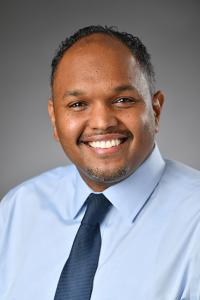Joel Gabre, MD: The Path to Becoming a Physician-Scientist
As a physician-scientist, Joel Gabre, MD is able to seamlessly combine two distinct but complementary aspects of his personality: the desire to help others and a relentless curiosity about the world. His parents immigrated from Ethiopia to the United States to work at universities and emphasized the importance of education — science, in particular — from a young age.
“Both of my parents were in academia, so that research mindset was always instilled,” says Gabre, member of the Herbert Irving Comprehensive Cancer Center (HICCC) and assistant professor of medicine at New York-Presbyterian/Columbia University Irving Medical Center (CUIMC). “And because of that, as well as the opportunity to help people, medicine became my goal early on.”
Today, Gabre is a gastroenterologist and gastrointestinal (GI) cancer genetics specialist who studies diseases of the upper GI tract with particular focus on the esophagus. He heads the Columbia UniveRsity Esophageal (CURE) Tissue Culture Lab, which integrates clinical outcomes data, multi-omics, and novel 3D culture model systems to develop translational tools to study and treat disorders of the upper GI tract.
After growing up in Huntsville, Alabama, he moved to Baltimore to attend Johns Hopkins University, graduating with an undergraduate degree in biophysics. He went on to attend medical school at the University of Maryland, which is where the idea of becoming a research scientist originated. As a third-year medical student in a surgical oncology rotation, Gabre found himself fascinated with the many unanswered questions related to cancer.
“Why do pancreatic cancer patients have such a poor prognosis? Why does chemotherapy not work?” he says. “I was so engrossed in the basic science that a faculty member approached me and asked if I had thought about doing research.”
Gabre began working in the lab of a surgeon-scientist, and his ambitions shifted to research in addition to being a clinician. He later completed his internal medicine residency at the University of Cincinnati, and gastroenterology fellowship and post-doctoral research fellowship at the University of Pennsylvania, where he became chief GI fellow.
“I realized that helping people could be more than just seeing patients in the hospital,” he says. “I can also make observations in the clinic, ask questions, and then use the tools of the lab to answer questions that are clinically relevant.”
At the University of Cincinnati, he served as a resident physician in the lab of Yana Zavros, PhD, where he first learned how to model gastrointestinal malignancies using advanced 3D cell culture techniques. He also introduced and helped develop a protocol to use patient-derived 3D gastric cancer organoids for personalized medicine.
While at Penn, he joined the lab of Anil K. Rustgi, MD. When Rustgi started as director of the HICCC in 2018, Gabre followed. At Columbia, he focused his research on using 3D esophageal organoids to study mechanisms of cellular plasticity and trans-differentiation. The experience working in the Rustgi lab solidified his decision to become a physician-scientist like his mentor.
Gabre started The CURE Tissue Culture Lab in 2023. He plans to investigate the molecular mechanisms of GI cancers — in particular, esophageal adenocarcinoma, which is the predominant subtype in the United States — and how to stratify patients based on their molecular features. The translational part of his research tries to identify better therapeutics through tumor models such as 3D patient-derived organoids.
For example, his lab grows and analyzes 3D organoids to understand how the immune microenvironment of early-onset colon cancer is different from late-onset colorectal cancer.
“We hope understanding this biology might help us develop better hypotheses as to what environmental factor or factors might apply,” said Gabre. “Additionally, this analysis may provide for some unique therapeutic vulnerabilities that we may be able to target.”
In 2023, he was one of six investigators who received a Clinical Trialist Early Career Development Scholars Award, which provides funding for innovative clinical trials that aim to advance treatment and interventions for underrepresented groups. His project will focus on the use of patient-derived organoids of esophageal adenocarcinoma as a personalized medicine strategy.
Outside of the lab, Gabre is involved in recruitment activities with the residency program to recruit more physician-scientists to Columbia.
“The path as a physician-scientist is long. Sometimes life makes it difficult to continue to do both,” he says. “One of my goals is to make the environment easier for trainees.”

